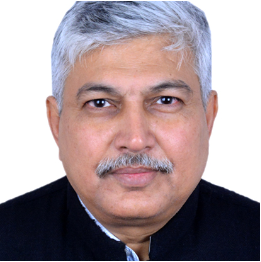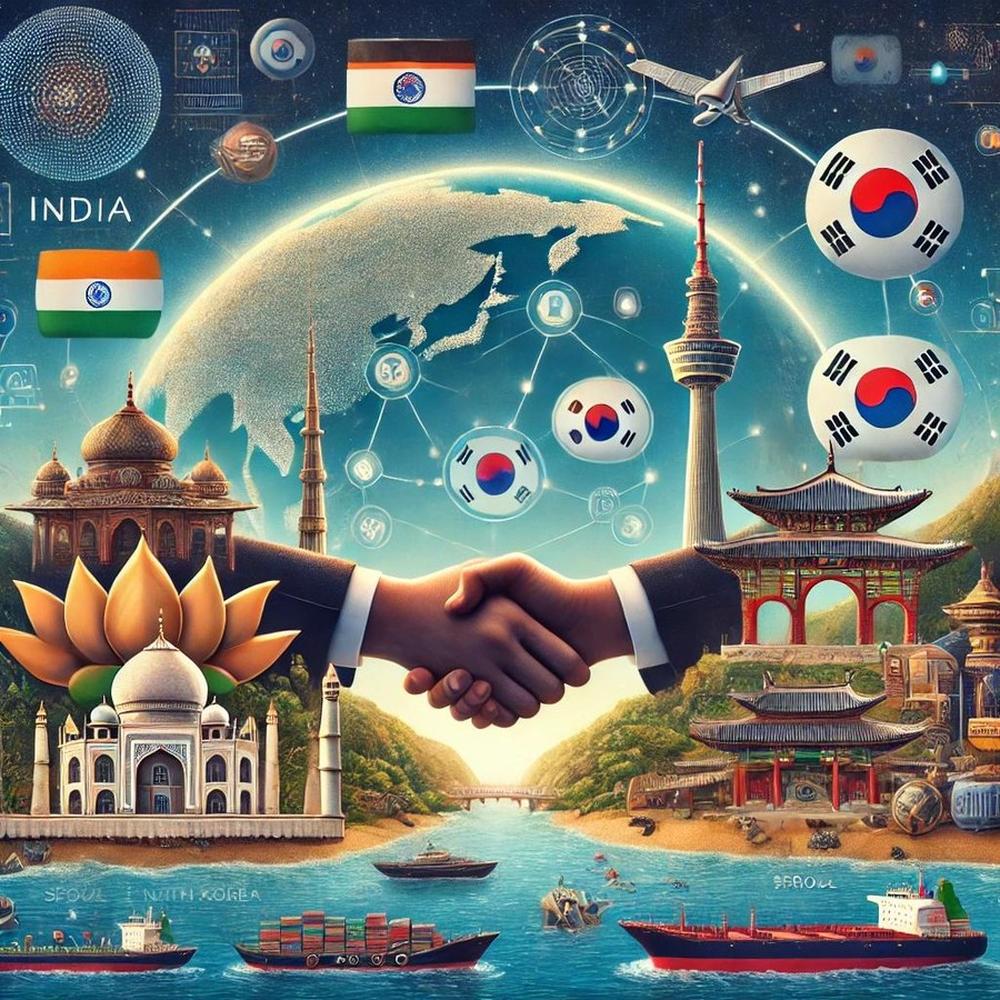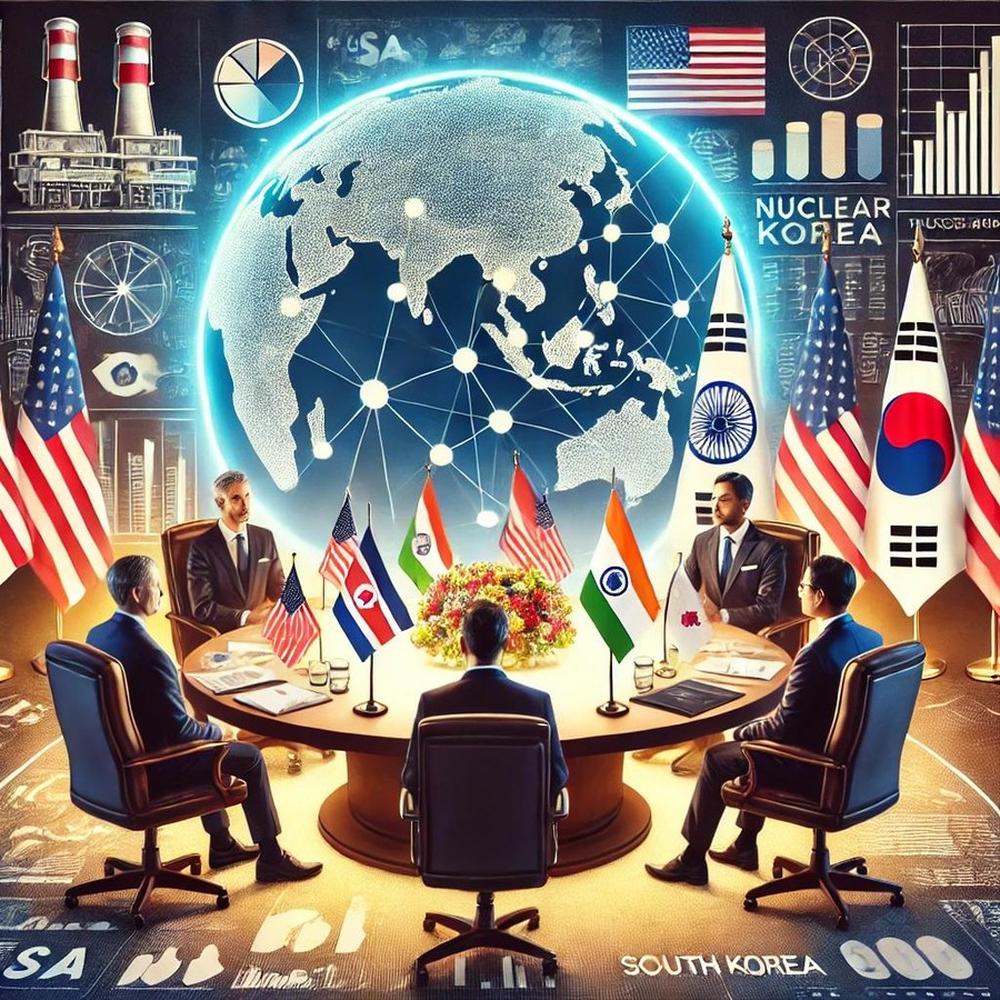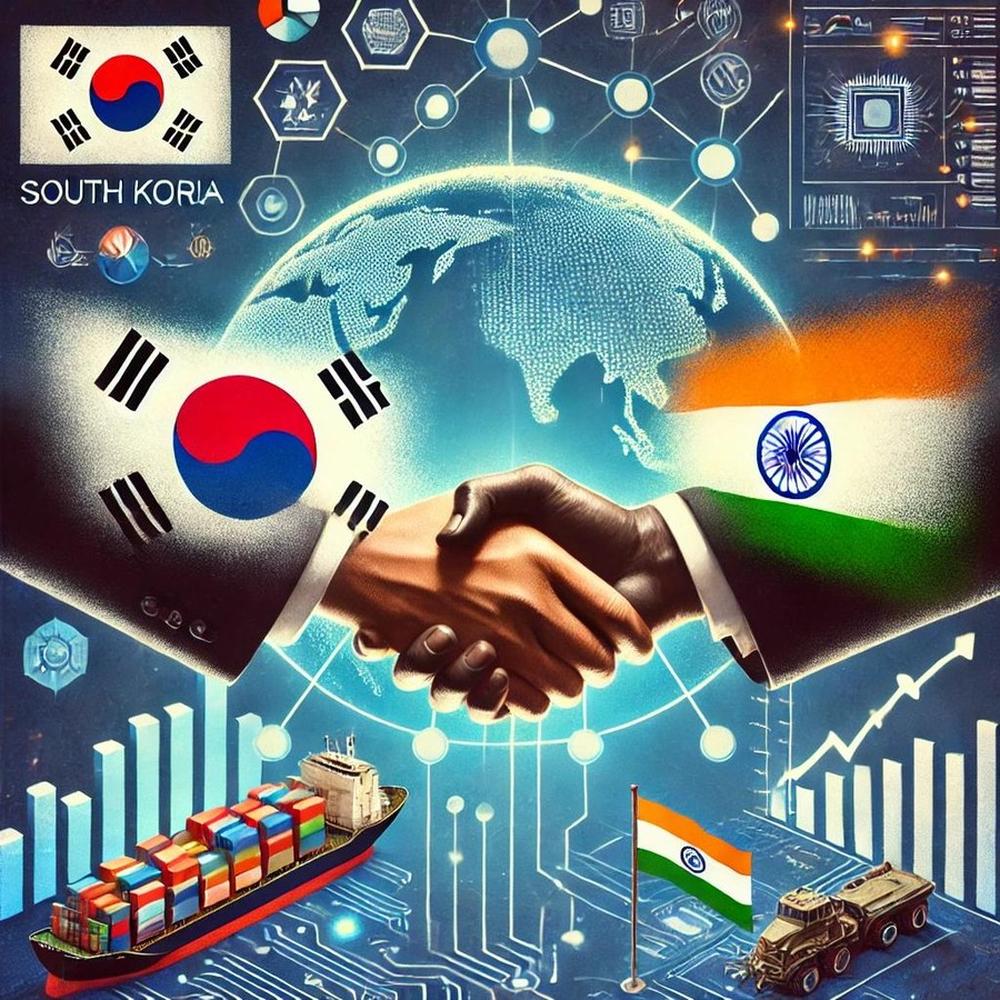
- #Economy & Trade
- #Global Issues
- #Multilateral Relations
- #US Foreign Policy

▶ India and South Korea's multidimensional relationship spans economic, cultural, and defense ties, with significant potential for deeper collaboration in the Indo-Pacific region, particularly in areas like maritime security, non-proliferation, and emerging technologies.
▶ The return of Trump’s administration could reshape global dynamics, presenting both challenges and opportunities for India and South Korea to enhance bilateral cooperation through defense collaboration, supply chain resilience, and infrastructure development in response to U.S. policy changes.
▶ By aligning their Indo-Pacific strategies, India and South Korea can amplify their influence on regional security, economic growth, and sustainability while addressing global challenges like climate change, food security, and nuclear energy development.
The historically evolved relationship between India and South Korea continues to expand, finding new dimensions for deeper engagement. Along this journey, it traverses multiple domains, carving distinct contours. This multidimensional partnership spans economic, cultural, and defence ties, among others. Looking ahead, the relationship must adapt to the shifting dynamics of the global geopolitical landscape, particularly during the second Trump administration.
India traditionally refrains from labelling itself as an ally of any nation, instead identifying with its heritage as a Non-Aligned Movement country. However, it has forged robust friendships and partnerships, notably with the United States. This relationship has been put on a fast track, despite occasional hurdles, under a Comprehensive Global and Strategic Partnership—described as "the defining partnership of the 21st century." Both nations are key members of the Quad, and grouping poised to elevate Indo-Pacific cooperation. The Quad is also engaging with other nations in the region and beyond.
South Korea, although not a member of North Atlantic Treaty Organisation (NATO), is a partner in the Indo-Pacific along with Australia, Japan, and New Zealand. As a close ally of the United States (US), it benefits from America's nuclear umbrella and has established the Nuclear Consultative Group to strengthen defence collaboration. Beyond security, South Korea and the US maintain extensive cooperation across various non-security sectors.
In the US, Donald Trump, a Republican, has been re-elected as President and is set to assume office on January 20, 2025. His first term serves as a strong indicator of what to expect in the next four years. Early signals from his speeches and policy pronouncements during the 2024 campaign suggest continuity with the themes of his previous administration. As the world—including America's allies—prepares for the second Trump administration, India and South Korea must also consider how their bilateral relationship will adapt to these changes. Trump's policies may present both challenges and opportunities for this partnership.
Trump’s overtures suggested that President Trump might aim to facilitate the resolution of the conflict in Ukraine. Once the conflict in the Ukrainian theater concludes, the US could shift greater attention to the Indo-Pacific region. India, as a member of the Quad, and South Korea, with its robust Indo-Pacific strategy, are well-positioned to play significant roles in this strategic shift. South Korea has made considerable progress in advancing its strategy across several key areas, submitting a report in December 2023 outlining achievements in nine core lines of effort.
India and South Korea, both democracies, share a commitment to a norms- and rules-based international order. South Korea actively engages with Quad members, such as the United States and Japan, to promote freedom, peace, and prosperity in the Indo-Pacific. South Korea and India could enhance their partnership by supporting South Korea’s regional strategy for the Indo-Pacific. With their established cooperative frameworks—India’s Association of South East Asian Nations (ASEAN)-India Comprehensive Strategic Partnership and South Korea’s Korea-ASEAN Solidarity Initiative—they can collaborate effectively to bolster regional strategies aligned with ASEAN priorities.
Environmental security is another shared commitment between South Korea and India in the Indo-Pacific. Both nations have been actively addressing climate change bilaterally, minilaterally, and multilaterally, providing assistance to Pacific Island countries. Continued engagement by their leadership is essential to sustaining partnerships with these nations. Additionally, both countries have the potential to enhance cooperation in humanitarian assistance and disaster relief (HADR) initiatives.
Maritime security presents another avenue for closer collaboration between India and South Korea. By working together on issues such as maritime safety, freedom of navigation, and regional stability, the two nations can strengthen their strategic alignment in the Indo-Pacific region.
Support for Non-Proliferation and Counter-Terrorism in the Indo-Pacific Region is a shared policy priority for South Korea, the United States, and India. South Korea and India can leverage various bilateral and multilateral forums to collaborate on nuclear disarmament, non-proliferation, export controls, and addressing the North Korean nuclear and missile program. Notably, their bilateral efforts could play a critical role in monitoring and preventing sea-based transactions involving weapons of mass destruction.
The Indo-Pacific offers numerous other areas for collaboration between South Korea and India. Cybersecurity stands out as a key domain where both nations can harness their technological expertise for mutual benefit. South Korea’s plans to diversify cultural exchanges and expand digital public diplomacy also present an opportunity for India to become a valuable partner. Furthermore, both countries align in their commitment to addressing short- and long-term food security challenges, with no evident conflicts in this area.
The Indo-Pacific nuclear energy market, particularly in small and modular nuclear reactor (SMR) development, represents another promising area of cooperation. Following prolonged internal deliberations, both South Korea and India have actively pursued SMR development and commercialization. Pooling their resources and expertise could address the energy needs of the Indo-Pacific region, especially for small Pacific island nations with limited grid capacities. Simultaneously, both countries must prioritize nuclear safety and security, emphasizing the role of the International Atomic Energy Agency (IAEA) as a central player.
The global community, including U.S. allies like South Korea and India, has expressed concerns about the potential economic disruptions caused by the Trump administration's tariff policies and hardline economic negotiations. To mitigate these challenges, South Korea and India can turn to mechanisms like Economic Security Networks and the Indo-Pacific Economic Framework for Prosperity. These platforms can help offset the adverse effects of such policies while exploring new opportunities across Indo-Pacific economies.
South Korea and India could collaborate on developing infrastructure networks within the region. Joint investments in sustainable and resilient infrastructure would not only deepen their partnership but also strengthen connectivity and economic growth across the Indo-Pacific.
The global discourse on supply chain resilience increasingly highlights the Indo-Pacific region's pivotal role in strengthening these networks. Supply chains for critical minerals are particularly vital, as they form the backbone of the next-generation critical and emerging technologies driving global development. India is already collaborating on these technologies with Quad nations, including the US. South Korea, making significant strides in this domain, could partner bilaterally with India to advance these technologies, benefiting the entire region.
If the Trump administration fails to end the war in Ukraine, the current geopolitical situation may persist. While the Indo-Pacific will remain strategically important, global attention could continue to be divided. Even in such a scenario, South Korea and India could capitalize on opportunities in defence cooperation. South Korea's defence industry, already among the top ten arms exporters globally, aims to secure the fourth position by 2027. NATO countries, including Poland, are major recipients of South Korean arms.
India, traditionally a minor arms exporter, is also increasing its footprint in the global arms market. Notably, India has engaged with South Korea to procure arms such as self-propelled howitzers. Given India's strategy of co-manufacturing arms with its suppliers, a similar collaboration with South Korea could be pursued to produce defence equipment for export to the global market.
In summary, during the second Trump administration, the Indo-Pacific region would remain the most promising area for deepening the South Korea-India partnership. While Europe and West Asia/Middle East may continue as active conflict zones, indicators suggest the Indo-Pacific will be a dynamic arena for security and economic challenges. Both India and South Korea are independently active across these regions. By working together, they could achieve a more significant strategic impact, regardless of the direction of U.S. policy under a new Trump administration.

Dr. Rajiv Nayan is a Senior Research Associate at the Institute for Defence Studies and Analyses, New Delhi. He has been working with the Institute since 1993, where he specializes in international relations, and security issues, especially the politics of nuclear disarmament, export control, non-proliferation, and arms control. Rajiv was a Visiting Research Fellow at the Japan Institute of International Affairs, Tokyo, where he published his monograph- Non-Proliferation Issues in South Asia. He was also a Senior Researcher at Peace Research Institute Oslo, a Senior Visiting Research Fellow at King’s College London and a Visiting Fulbright Scholar at the Center on International Cooperation, New York University. He holds a Ph.D. a Master of Philosophy in Disarmament Studies and a Master of Arts in International Relations from Jawaharlal Nehru University, New Delhi. In his doctoral dissertation, he studied the implications of the Missile Technology Control Regime for Indian security and economy. Rajiv Nayan has published books, as well as papers in academic journals, and as chapters of books. His single-authored book-- the Global Strategic Trade Management-- has been published by Springer. His edited book-Nuclear Non-Proliferation Treaty and India, was published by Routledge in May 2011 and coedited Pakistan’s Security Dynamics and Nuclear Weapons in 2022. He has contributed articles to numerous newspapers, including the International Herald Tribune, the Asahi Shimbun, the Hindustan Times and the Times of India. His articles have also appeared in the world’s leading journals such as the Bulletin of Atomic Scientists and Strategic Analysis. His articles have appeared in the famous Jane’s Intelligence Review as well. At present, Rajiv is the Secretary-General of the Indian Association of International Studies. He is a member of the Executive Council of Maulana Abul Kalam Azad Institute of Asian Studies, Kolkata. He is an Indian partner of the International Nuclear Security Forum which is a Washington-based group of Non-Governmental Organisations active in nuclear security. Rajiv is also on the Advisory Council of the Delhi School of Transnational Affairs, Delhi University. Rajiv is a founding member of the Defence Innovators and Industry Association. He also serves on different expert committees of the Indian Council of Social Sciences Research. He is on the Board of Studies of several universities' Defence and Security Studies. Rajiv was a member of the governing council of the International Export Controls Association, hosted by the University of Georgia in Washington, DC, a member of the Academic Council of Jawaharlal Nehru University, and a member of the Export Controls Experts Group and Multilateral Security Governance in Northeast Asia/North Pacific of the Council for Security Cooperation in Asia Pacific (CSCAP). He was on the Committee of the Ministry of Defence on the Convention on Certain Conventional Weapons. Rajiv served on the governing bodies of three colleges of Delhi University—Aryabhatt College, Maitreyi College and Satyawati College. He was a Member of the Regional Network of Strategic Studies Centers Weapons of Mass Destruction/Border Security Working Group. He was an interim convener and also on the Executive Council of the Indian Pugwash Society. Rajiv was also on the Board of Studies of the School of International Studies, Jawaharlal Nehru University.


